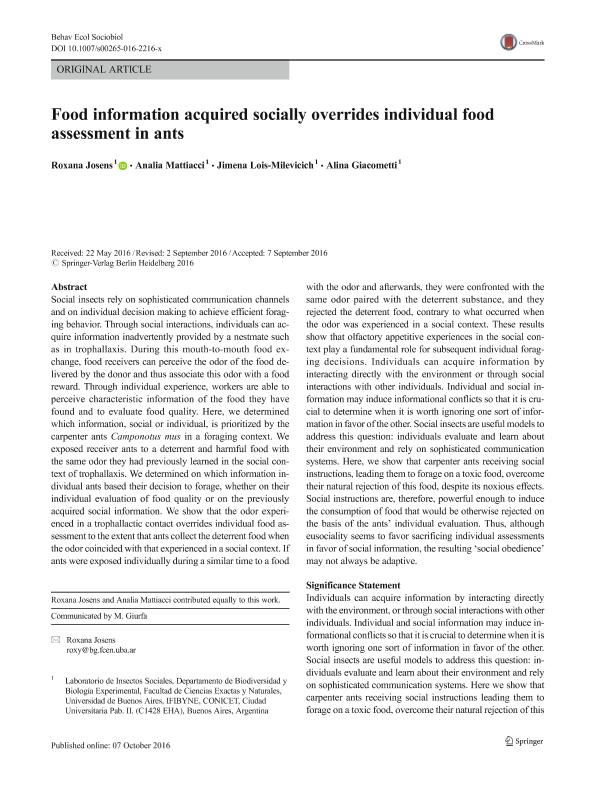Mostrar el registro sencillo del ítem
dc.contributor.author
Josens, Roxana Beatriz

dc.contributor.author
Mattiacci, Analia

dc.contributor.author
Lois Milevicich, Jimena

dc.contributor.author
Giacometti, Alina

dc.date.available
2018-10-01T19:46:22Z
dc.date.issued
2016-12
dc.identifier.citation
Josens, Roxana Beatriz; Mattiacci, Analia; Lois Milevicich, Jimena; Giacometti, Alina; Food information acquired socially overrides individual food assessment in ants; Springer; Behavioral Ecology And Sociobiology; 70; 12; 12-2016; 2127-2138
dc.identifier.issn
0340-5443
dc.identifier.uri
http://hdl.handle.net/11336/61440
dc.description.abstract
Abstract: Social insects rely on sophisticated communication channels and on individual decision making to achieve efficient foraging behavior. Through social interactions, individuals can acquire information inadvertently provided by a nestmate such as in trophallaxis. During this mouth-to-mouth food exchange, food receivers can perceive the odor of the food delivered by the donor and thus associate this odor with a food reward. Through individual experience, workers are able to perceive characteristic information of the food they have found and to evaluate food quality. Here, we determined which information, social or individual, is prioritized by the carpenter ants Camponotus mus in a foraging context. We exposed receiver ants to a deterrent and harmful food with the same odor they had previously learned in the social context of trophallaxis. We determined on which information individual ants based their decision to forage, whether on their individual evaluation of food quality or on the previously acquired social information. We show that the odor experienced in a trophallactic contact overrides individual food assessment to the extent that ants collect the deterrent food when the odor coincided with that experienced in a social context. If ants were exposed individually during a similar time to a food with the odor and afterwards, they were confronted with the same odor paired with the deterrent substance, and they rejected the deterrent food, contrary to what occurred when the odor was experienced in a social context. These results show that olfactory appetitive experiences in the social context play a fundamental role for subsequent individual foraging decisions. Individuals can acquire information by interacting directly with the environment or through social interactions with other individuals. Individual and social information may induce informational conflicts so that it is crucial to determine when it is worth ignoring one sort of information in favor of the other. Social insects are useful models to address this question: individuals evaluate and learn about their environment and rely on sophisticated communication systems. Here, we show that carpenter ants receiving social instructions, leading them to forage on a toxic food, overcome their natural rejection of this food, despite its noxious effects. Social instructions are, therefore, powerful enough to induce the consumption of food that would be otherwise rejected on the basis of the ants’ individual evaluation. Thus, although eusociality seems to favor sacrificing individual assessments in favor of social information, the resulting ‘social obedience’ may not always be adaptive. Significance Statement: Individuals can acquire information by interacting directly with the environment, or through social interactions with other individuals. Individual and social information may induce informational conflicts so that it is crucial to determine when it is worth ignoring one sort of information in favor of the other. Social insects are useful models to address this question: individuals evaluate and learn about their environment and rely on sophisticated communication systems. Here we show that carpenter ants receiving social instructions leading them to forage on a toxic food, overcome their natural rejection of this food, despite its noxious effects. Social instructions are, therefore, powerful enough to induce the consumption of food that would be otherwise rejected on the basis of the ants‘ individual evaluation. Thus, although eusociality seems to favor sacrificing individual assessments in favor of social information, the resulting ‘social obedience’ may not always be adaptive.
dc.format
application/pdf
dc.language.iso
eng
dc.publisher
Springer

dc.rights
info:eu-repo/semantics/openAccess
dc.rights.uri
https://creativecommons.org/licenses/by-nc-sa/2.5/ar/
dc.subject
Ants
dc.subject
Foraging
dc.subject
Individual Information
dc.subject
Olfaction
dc.subject
Recruitment
dc.subject
Social Information
dc.subject.classification
Otras Ciencias Biológicas

dc.subject.classification
Ciencias Biológicas

dc.subject.classification
CIENCIAS NATURALES Y EXACTAS

dc.title
Food information acquired socially overrides individual food assessment in ants
dc.type
info:eu-repo/semantics/article
dc.type
info:ar-repo/semantics/artículo
dc.type
info:eu-repo/semantics/publishedVersion
dc.date.updated
2018-10-01T16:13:31Z
dc.journal.volume
70
dc.journal.number
12
dc.journal.pagination
2127-2138
dc.journal.pais
Alemania

dc.journal.ciudad
Berlin
dc.description.fil
Fil: Josens, Roxana Beatriz. Consejo Nacional de Investigaciones Científicas y Técnicas. Oficina de Coordinación Administrativa Ciudad Universitaria. Instituto de Fisiología, Biología Molecular y Neurociencias. Universidad de Buenos Aires. Facultad de Ciencias Exactas y Naturales. Instituto de Fisiología, Biología Molecular y Neurociencias; Argentina
dc.description.fil
Fil: Mattiacci, Analia. Consejo Nacional de Investigaciones Científicas y Técnicas. Oficina de Coordinación Administrativa Ciudad Universitaria. Instituto de Fisiología, Biología Molecular y Neurociencias. Universidad de Buenos Aires. Facultad de Ciencias Exactas y Naturales. Instituto de Fisiología, Biología Molecular y Neurociencias; Argentina
dc.description.fil
Fil: Lois Milevicich, Jimena. Consejo Nacional de Investigaciones Científicas y Técnicas. Oficina de Coordinación Administrativa Ciudad Universitaria. Instituto de Fisiología, Biología Molecular y Neurociencias. Universidad de Buenos Aires. Facultad de Ciencias Exactas y Naturales. Instituto de Fisiología, Biología Molecular y Neurociencias; Argentina
dc.description.fil
Fil: Giacometti, Alina. Consejo Nacional de Investigaciones Científicas y Técnicas. Oficina de Coordinación Administrativa Ciudad Universitaria. Instituto de Fisiología, Biología Molecular y Neurociencias. Universidad de Buenos Aires. Facultad de Ciencias Exactas y Naturales. Instituto de Fisiología, Biología Molecular y Neurociencias; Argentina
dc.journal.title
Behavioral Ecology And Sociobiology

dc.relation.alternativeid
info:eu-repo/semantics/altIdentifier/doi/https://dx.doi.org/10.1007/s00265-016-2216-x
dc.relation.alternativeid
info:eu-repo/semantics/altIdentifier/url/https://link.springer.com/article/10.1007/s00265-016-2216-x
Archivos asociados
